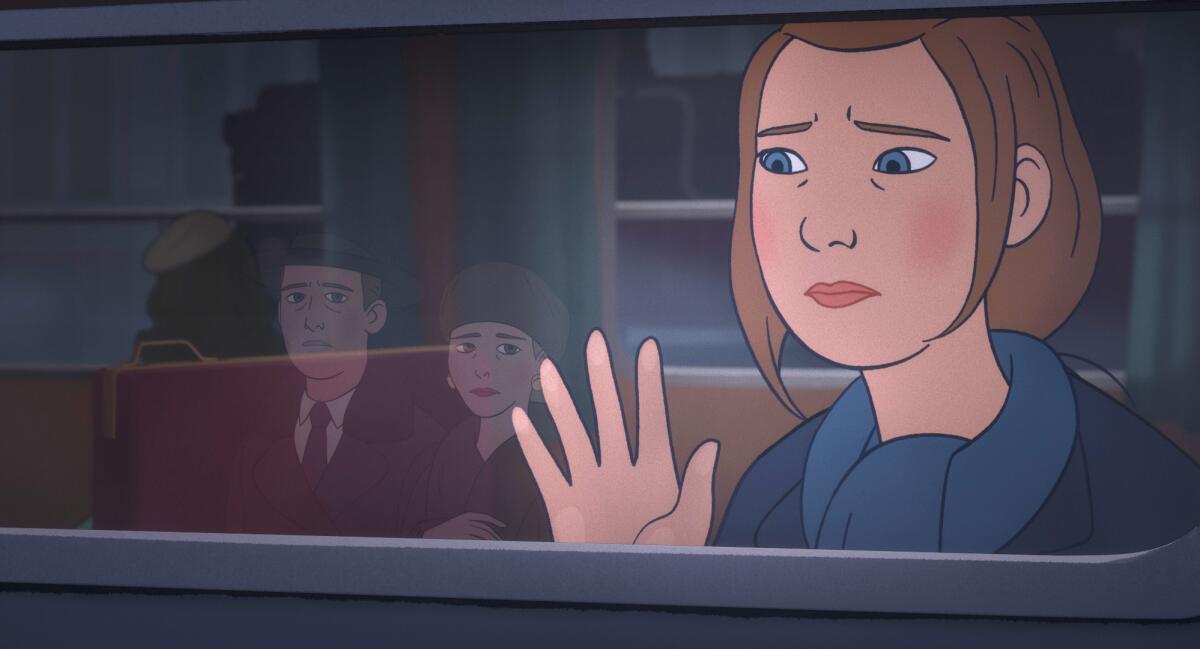‘Charlotte’ underwhelms in its animated portrait of a Holocaust artist

- Share via
“Charlotte,” the animated retelling of the true-life, World War II-era story of German-Jewish artist Charlotte Salomon, is more of a middling proposition than one might expect from this singular tale.
Salomon was yet another in the endless line of notable and compelling figures whose lives were shaped — and devastated — by the Holocaust. But the film, although lovingly made, often feels too rudimentarily written and rendered to be sufficiently impactful. (Dutch filmmaker Frans Weisz made both a 1981 live-action biopic and a 2012 documentary about Salomon, though they were not widely seen in the U.S.)
For your safety
The Times is committed to reviewing theatrical film releases during the COVID-19 pandemic. Because moviegoing carries risks during this time, we remind readers to follow health and safety guidelines as outlined by the CDC and local health officials.
Directed by Tahir Rana and Eric Warin, from a script by Erik Rutherford and David Bezmozgis, “Charlotte” mainly covers Salomon (voiced by Keira Knightley) from her teen years living in Berlin with her doctor father, Albert (Eddie Marsan), and opera-singer stepmother, Paula (the late Helen McCrory), until she and her husband, Alexander (Sam Claflin), are rounded up by the Gestapo and sent to Auschwitz a decade later.
Along the way, Salomon is accepted to and later dismissed (for being Jewish) from a prestigious Berlin art school, falls in and out of love with Paula’s singing instructor (Mark Strong) and escapes Nazi encroachment by moving to the Côte d’Azur home of a wealthy American expat (Sophie Okonedo), where her grandparents (Jim Broadbent, Brenda Blethyn) are ensconced. It’s there she meets and eventually marries Alexander, the estate’s caretaker, and embarks on an ambitious art project she names “Life? or Theatre?” a collection of 769 paintings of every memory Salomon could summon of her life — and then some. (Worried that she may have inherited her ancestors’ depressive tendencies, she notes: “Only by doing something mad can I hope to stay sane.”)
Some consider Salomon’s masterwork, housed at the Jewish Historical Museum in Amsterdam, to be the first graphic novel.
The traditional 2-D animation may feel consistent in some ways with Salomon’s painting style, done in gouache (or opaque watercolor). But the imagery here, though often colorful and evocative, isn’t especially moving or deep. Only several interludes depicting Salomon’s painting process as well as photographically inspired re-creations of such locations as Berlin’s Academy of Fine Arts, the Sistine Chapel and a burning synagogue truly stand out.
As for the narrative, it comes off more as a highlights reel than a fully organic, tension-building dramatization. It’s not helped by the largely elemental dialogue and the many cutaways from the story’s harsher moments. We certainly feel the dread of the Nazis’ mounting actions but there’s an overall simplicity here that keeps those, and several other horrors (including a startlingly desperate measure the artist takes toward the film’s end), at a distance.
In addition, despite the strength of the voice acting, it feels curious that the accents in this Canadian-French-Belgian co-production are mostly British when so many of the characters are German. (There’s a French version of the film toplined by Marion Cotillard.)
Still, for the chance to become acquainted with Salomon’s tragic and unique tale, as well as with her enduring output, this well-intended portrait is worth a look.
'Charlotte'
Not rated
Running time: 1 hour, 32 minutes
Playing: Starts April 22, Laemmle Royal Theatre, West Los Angeles; Laemmle Playhouse 7, Pasadena
More to Read
Only good movies
Get the Indie Focus newsletter, Mark Olsen's weekly guide to the world of cinema.
You may occasionally receive promotional content from the Los Angeles Times.







